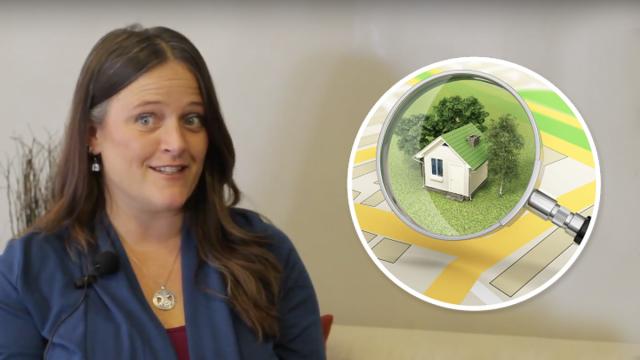
In this ongoing series, “From the Ground Up,” Occupy.com joins with Commonomics USA in presenting stories of local struggles for a new, sustainable economy.
Cassandra Ferrera is Chief Community Officer at Green Key Real Estate, a sustainability-oriented real estate company in Northern California’s Bay Area. The company is clearly in the real estate business, selling everything from villas to tracts of land, all pretty attractive. If you just briefly glance at Green Key’s web site and property listings, you might just see the company as another hip and green business enterprise. But if you look more closely, you notice Green Key also helps buyers transition into cooperative and semi-cooperative communities.
As you might surmise from her job title, Ferrera facilitates these transitions. In helping people find cooperative and sustainable housing arrangements through land trusts and other collectives, she leads people away from traditional property-owning capitalism into very different models of living. Ferrera and Green Key help people find homes in ecovillages, properties utilizing permaculture and natural systems, and similar communal arrangements.
In a community land trust, a nonprofit organization owns the land and leases it to home and building owners. The ownership and management model is shaped to constitute common ownership of the land – shared space with both private and community buildings, often utilizing communally-owned vehicles and other shared resources. Members may build their own houses or rent living space. Some may run small businesses in accordance with the rules of the trust, which can be fashioned to limit income inequality. Because the community may limit profitability on home sales and business practices, members’ business or home sale decisions aren't motivated primarily by money.
Why support land trusts, cooperatives and ecovillages? These arrangements can save amazing amounts of money, allowing people to live on far fewer resources at a far less cost than “mainstream” society. Communities can choose to live in conditions of near-absolute ecological sustainability, using the same scaling and organizational efficiency that makes these communities so inexpensive. It is no exaggeration to say that in building and facilitating entry into these communities, Cassandra and others like her are building the model communities of a sustainable and cooperative future. If you’re guessing I had a fascinating conversation with her, you’re correct.
Matt Stannard: Most people think of real estate as something individually owned or owned with family, just very closely knit private ownership. Your work points to something different. Can you talk about that?
Cassandra Ferrara: Real estate has certainly evolved to reflect our societal notions of “private property ownership.” Common practice of real estate and home finance is designed with this cultural assumption deeply embedded in the design of how we transact parcels of the Earth. However, we know that water, air, animals and all of the living world do not obey private property lines. Our parcels of the Earth are connected in an un-divisible whole.
MS: How does your practice in real estate transactions reflect this knowledge?
CF: The kind of real estate we practice acknowledges that there is a fundamental re-establishment of this interconnection of the health of our watersheds, our foodsheds and our human communities. More than ever before, it seems that people are ready to band together to collectively steward the Earth. We have huge indoctrinated systems to hack, heal and transform.
We call it cooperative real estate because it points to the fact that we are cooperating amongst ourselves as humans, and with the non-human world that is the ecosystem that we are embedded in. On a practical level, this means we work a lot with groups of people desiring to live together in a deeply committed relationship to their place. This drive toward collective stewardship is taking many different forms.
MS: What specific regulations and laws, or categories or types of regulation and law, stand in the way of your “perfect world” in terms of sustainable, community ownership?
CF: Unfortunately, sustainability and collective stewardship are not as “legal” as they will eventually be. We are going to need to work on our zoning laws to allow for greater, clustered housing density to provide for affordable, modest homes for people who are committed to living in a more sustainable lifestyle.
MS: If you could change a few laws or regulations, what would they be?
CF: If I could, I would change zoning laws to allow for different development capacities for land that was held in a protected community land trust context. It’s important in rural lands to protect that higher housing density from getting in the hands of subdivision developers. So, maybe new zoning for land held in trust is a good solution.
In certain areas, there are laws about how many non-related people can live together. That seems archaic and just plain weird. So we need to update that to reflect the current complexity that many family systems are evolving into. People need to be able to legally find and live with their found family.
MS: What about financing? What needs to change about money?
CF: On a financial level, we need lending institutions to be willing to work with groups of people sharing “ownership” of un-dividable land. Banks generally can’t wrap their heads around the group “buyer.” And that is growing niche in today’s world.
MS: Any other changes?
CF:Composting toilets. We need to legalize alternative and healthier systems for dealing with human waste so that we stop contaminating clean water and provide more economic and ecological, small scale solutions. We need to stop pooping in drinking water; it’s just too precious and it’s unnecessary. This will go a long way to helping with higher density in rural lands if we don’t have to do standard septic systems. It will change our understanding of what the true carrying capacity of our land is.
If I could wave a magic wand, schools would also be educating everyone in a more permacultural way of design with, and as members of, the ecosystems so we could actually establish better feedback loops for how we settle land together.
MS: There’s a predatory attribute to capitalism, where it tends to “consume” or overwhelm cooperativism. Is your intent to disrupt and challenge this? How do you seek to subvert the system?
CF: Well, I do love to disrupt this system by being a truth-seeking, honest and transparent person who works collaboratively in an otherwise competitive and defensive system. So, just clearing a field within real estate in which we say, we work with people who are working together to steward the earth, is in and of itself subversive. Other real estate agents don’t know what to do with those clients, but they are my inspiration.
On a systems level, I am most excited about community land trusts as a way to move land out of the speculative real estate market and into the public trust. This solves so many problems when it comes to establishing permanent affordability for homes that can be cooperatively managed by the people who live there. So we also get more self-governance.
Through the community land trust [movement], we can establish an ethos at the local level of how we hold those lands in trust and re-learn how to care for the land and each other in a way that is not just about “me and mine.” This is positively disruptive on lots of levels. From the personal to the systemic, I sense great promise in it. It is so important that we provide a counterbalance to the continuous land grab that provokes a seemingly endless housing crisis. It’s time for a land reform movement.
Matt Stannard is policy director at Commonomics USA and a member of the board of the Public Banking Institute.

If you liked what you read and want to see more original reporting on Occupy.com, please donate today!
3 WAYS TO SHOW YOUR SUPPORT
- Log in to post comments















